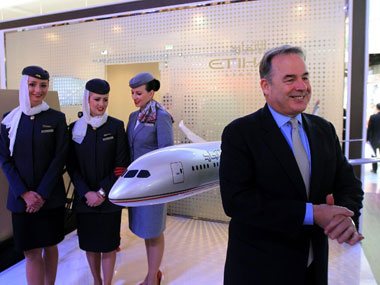New Delhi: The deal between Jet Airways and Etihad Airways, dependent on India and Abu Dhabi agreeing to increase entitlements to well over 50,000 seats a week, will change the Indian aviation scenario forever.
There is still no official confirmation of negotiations between the two governments being concluded or of so many seats being agreed upon. But rumours have been flying thick and fast since yesterday evening of the agreement having been sealed, which is perhaps why the equity deal between the two airlines was announced this morning.
If everyone - Air India, other airlines, airport operators and even Members of Parliament - had made their opposition to a quantum increase in seat entitlements clear, why did the Ministry of Civil Aviation go ahead with these talks?
[caption id=“attachment_725591” align=“alignleft” width=“380”] Not only will Jet get access to a well established international network, through the equity deal with Etihad it will also get access to much cheaper Aviation Turbine Fuel[/caption]
A senior ministry official believes that not only fears of this seat entitlement increase are unfounded, now competition will intensify between two Gulf carriers - Etihad and Emirates - instead of eating into Air India’s market share!
This official admitted that negotiations started between the two countries despite neither side having exhausted the current seat capacities. As of now, airlines from either side are allowed 13,300 seats a week; the new plan envisages over 55,000 seats a week. The breakup: Jet 42,000, IndiGo 5,060, SpiceJet 5,000 and Air India Express 3,000.
Impact Shorts
More Shorts“These talks are being conducted because Jet has sought a large increase and this is related to its expansion plans. Besides, all the criticism surrounding the talks is not justified. When India increased seat entitlements with Dubai earlier, we faced similar criticism. Now look at the situation: almost all the seat increases are being used by airlines of both India and Dubai. So obviously traffic potential is there,” this official said.
Previous Civil Aviation Minister Praful Patel had come under unprecedented criticism for the audacious manner in which flying rights were handed to foreign carriers during his time, particularly in the case of Emirates. In a 2011 report, CAG pointed out that between 2005 and 2010, Dubai’s bilateral entitlements grew from 10,400 seats to 54,000 seats per week! It also pointed out that Emirates was able to derive substantially greater traffic under the Dubai bilateral due to sixth freedom traffic, which means passengers flying between two countries while stopping in one’s own country. All this while, Indian carriers were essentially carrying only third or fourth freedom traffic between India and Dubai.
The ministry official quoted earlier did not answer specific questions on whether the Ministry would now favourably consider fresh requests by Dubai’s Emirates to again double entitlements.
This official also rubbished Air India’s claims that its international operations would be hurt by allowing Etihad such sweeping increase in seats. “AI caters to a different category of passengers through non-stop flights to the US. Why would such passengers want to fly through Abu Dhabi. The two kinds of traffic is different”. He also pointed out that instead of affecting Air India, the massive increase in seat entitlements to Etihad will fuel competition between Etihad and Emirates.
Wishful thinking or fact? Jet is clear about taking passengers from tier II and smaller cities directly to Abu Dhabi and then providing them onward connections to Americas and other western countries.
So essentially, it will feed India’s domestic traffic into Etihad global network.
It is still early to determine whether Air India’s loss by allowing such inroads to Etihad is irreparable. Not only will Jet get access to a well-established international network, through the equity deal with Etihad, it will also get access to much cheaper Aviation Turbine Fuel (ATF).
Perhaps now is the time for the Indian Government to make the operating environment less costly for its own carriers by reducing the taxation on ATF available in India.


)

)
)
)
)
)
)
)
)



